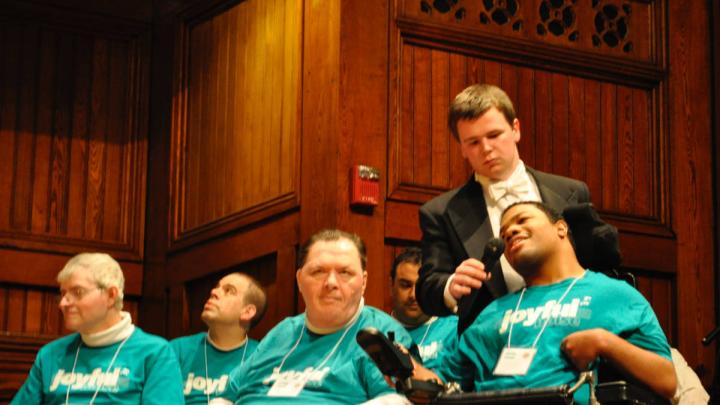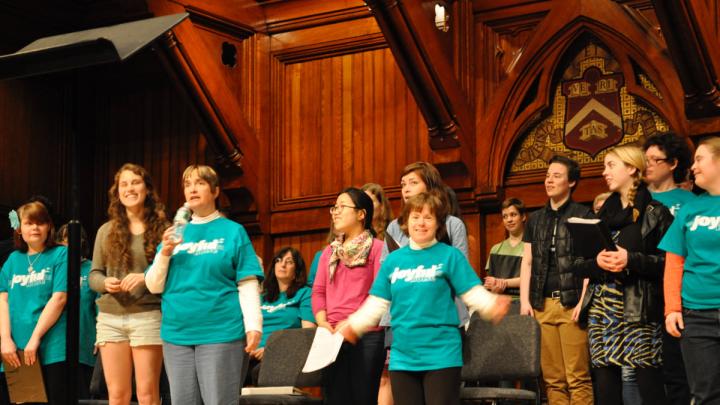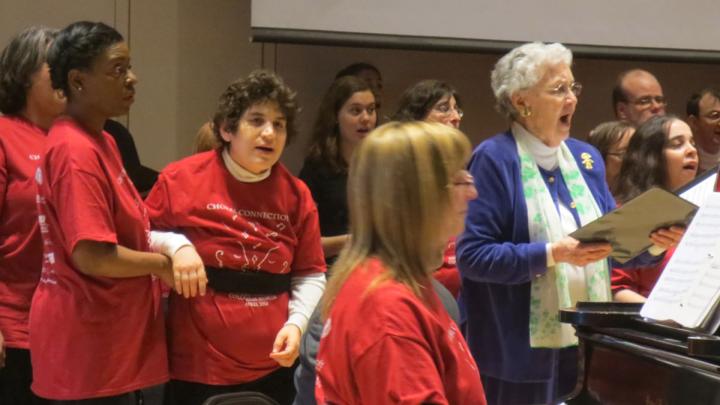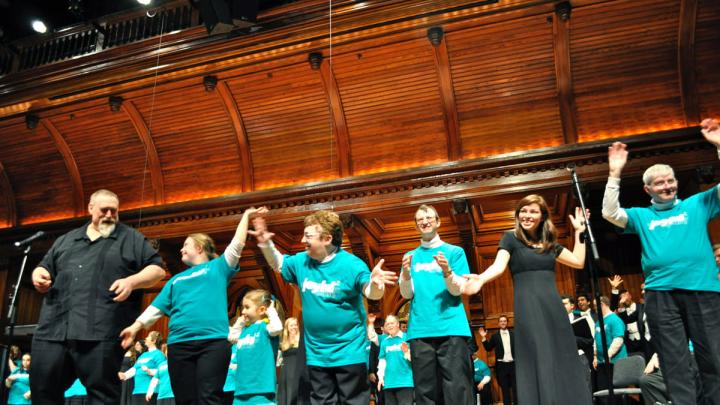Members of the Harvard-Radcliffe Collegium Musicum are accustomed to sharing the stage: since its inception in 1971, its singers have often sung alongside fellow undergraduates in the Harvard-Radcliffe Orchestra, the Harvard Glee Club, and the Radcliffe Choral Society. But on the first real weekend of spring in Cambridge, Collegium opened itself to collaboration outside the ivory tower. In Sanders Theatre on Friday, April 11, the choir kicked off its weekend-long “Boundless Realms of Joy” residency, featuring both the famous composer, conductor, and arranger Alice Parker and the Joyful Noise chorus—45 adults, ranging in age from 17 to 70, who live with neurological and physical challenges and acquired brain injuries.
Collegium greeted concertgoers that Friday evening with fairly standard spring concert fare, opening with a piece by Handel, Chandos Anthem #9, “O Praise the Lord With One Consent.” Accompanied by the Brattle Street Chamber Players, a student orchestra, they performed with a glossy beauty befitting the highbrow selection. But once the group brought the work to a close, singing “Ye boundless realms of joy, exalt your Maker’s fame,” they started to shake up the typical choral concert program.
After the applause, senior lecturer on music and director of choral activities Andrew Clark introduced a special guest: Alice Parker, whom he declared “the dean” of choral music in the United States. As she climbed the stairs to the stage, the cheers from fans in the audience made her status clear. “If you’ve sung in any choir, you’ve sung arrangements by Alice Parker,” noted Collegium manager Taylor Weary ’16 after the show. And with Parker’s presence, the singers, too, seem buoyed as she conducted them in a selection of warm, cascading American spirituals and hymns she had arranged.
But the true transformation came after intermission, after coordinators had busily readied the Sanders stage: placing wheelchair ramps to connect its upper and lower sections, arranging rows of folding chairs, and adjusting microphone stands. With these alterations in place, Collegium welcomed the Joyful Noise chorus. Its members had traveled to Cambridge from southern New Jersey and Delaware, but only after months of work on both sides.
Clark had first presented the idea of a joint concert to Joyful Noise co-founder and conductor Allison Fromm last year, when the two reconnected at a conference, after meeting several years before. Last Fourth of July, Clark, along with the University’s Choral Associate, Michael Pfitzer, and Collegium president Maura Church ’14, watched and then participated in a Joyful Noise concert at a nursing home in New Jersey. Soon after, Fromm and Clark found themselves working together again at Woodlands, a Pittsburgh-based summer camp for children and adults with disabilities. There, they began to discuss the possibility of bringing the chorus to Harvard for a concert. “How daunting would that be, to bring 30 singers from New Jersey and Delaware all the way to Boston?” Fromm recalled thinking. “It was a gradually growing collaboration,” she says. (The logistics were eased in part by Joyful Noise’s partnership with Bancroft, a nonprofit organization that provides services to individuals with special needs and owns and/or staffs the housing where more than half its singers live. Bancroft provided half of the staff caregivers who cared for singers on their eventual trip north.)
The rest of Collegium’s members first met the singers of Joyful Noise in February. On their way to a performance in Baltimore, they detoured to southern New Jersey for a combined rehearsal, followed by dinner with the Joyful Noise singers and their families. “Talking with them over dinner about how important music is to them, and how important it is to us, really let us form a bond in February,” Church reported. “People remembered each other” when they met again during the weekend residency.
During Friday night’s concert, Collegium and Joyful Noise also invited the audience to share the bond that they had forged, encouraging the crowd to stand and sing along. One song featured was an entirely new composition, its music penned by junior Gus Ruchman, and its lyrics written by audience member Sara Pyszka, an author and lyricist living with cerebral palsy. The collaboration came about through Andrew Clark: a friend of Pyszka’s from his time at Woodlands, he approached Ruchman last fall about working with Pyszka. She composed a poem for the occasion, and Fromm provided Ruchman with guidelines about composing a piece for Joyful Noise to sing. Together, composer and librettist created “Hear My Music,” premiered by the combined choirs on stage at Sanders (The concert was also the first time the two were able to meet in person: they had collaborated through e-mail. For Ruchman, “The highlight of the weekend was getting to meet [Pyszka] and talk about the piece and talk about life.”)
The crowd sang along to “Hear My Music,” its words printed in the program, and honored its creators with a standing ovation. As the audience members took their seats, the notes of the classic “What a Wonderful World,” first recorded by Louis Armstrong, began to emerge from the orchestra. Collegium member Neal Champagne ’17 removed a microphone from its stand and held it for Joyful Noise member Kevin Jackson, seated in his motorized wheelchair. Jackson sang the opening bars, and his voice rose over the crowd, unaccompanied by the other members of his choir, by the Harvard students with them on stage, or by the audience that had joined in for the last few songs. He closed his eyes and the words spilled out, quiet at first—this was Sanders Theatre, after all—but then clearer, surer, overwhelming in their beauty. “And I think to myself, what a wonderful world.” He held the last note, letting it glide out over the audience and slowly dissipate. The crowd erupted and the singers on stage smiled, full of many things, certainly, but above all—joy.
The residency continued on Saturday with a day long-symposium, “Beyond the Concert Hall: Exploring the Neurological, Therapeutic, and Social Benefits of Community Singing.” Doctors, psychologists, musicians, and conductors came together to discuss advances in scientific research about the power of song, as well as projects that aim to integrate discussions of disabilities with music.
“I was hoping for an experience that could kind of open us up to really getting at the heart of what music-making and community is all about,” Clark said of the symposium. The panels approached this heart from different angles: the morning sessions focused on answering scientific questions about why people sing and the ways in which singing opens up channels of expression for those with disabilities. After lunch, scholars discussed new studies that point to improved language-processing skills provided by music training, along with the positive effects of music therapy on Alzheimer’s patients, patients healing from surgery, and children whose disabilities mean that they are nonverbal.
The afternoon session ended with a presentation of the “Music of Difference Project,” founded by flutist Catherine Branch and composer Robert Bradshaw. The project—originally an attempt by Branch, who has cerebral palsy, to create with Bradshaw a musical rhythm of her unconventional way of walking—aims to reshape the way that concert audiences view disabilities, removing them from the periphery in order to create music that understands and embraces difference of all kinds. “The goal is to say, ‘I see the gifts and the struggles in her experience, and I find them in my own,’” Branch told the audience.
Certainly the discussion of disabilities in the concert hall was something Collegium members learned to confront during planning for the concert. Manager Taylor Weary spoke of the logistical obstacles that came with Joyful Noise’s visit to Harvard, from bringing in ramps for the stage to determining how to ensure that all those who needed to utilize Sanders Theatre’s slow wheelchair lift were able to make it onto the stage before show time. “It is usually challenging, putting on any old concert in Sanders,” she explained. “But bringing 40 adults with disabilities into a building that is not really that accessible—that was quite a challenge.”
For Weary, such obstacles served as a window onto the larger issues of accessibility for adults living with disabilities, many of whom face a startling lack of services after they leave public schools and youth programs. “Disability advocacy isn’t really there for adults,” she noted. But she also recognized the important role that Joyful Noise is able to play in raising awareness: “I hope that’s an inspiration to people in the audience or people who hear about them that more needs to be done in terms of advocacy for adults with disabilities.”
According to Allison Fromm, that kind of transformative effect is one of the most important aims of the choir’s performances, especially in its travels. “We always hope,” she said, “that when people hear us sing, they take away an inspiration to bring music to people in their lives who love to sing—people with disabilities, people in nursing homes, children who have disadvantages or challenges—to see how meaningful it is to come together and make music.”
Joyful Noise’s visit has had an effect on the other members of Collegium as well. “It can allow people to speak in ways that they can’t with words, and it can allow people to connect with people they thought they maybe couldn’t before,” Maura Church said. For Gus Ruchman, who plans to be a doctor, the concert and symposium were “reaffirming” for his belief in music and medicine. “This was really impactful in a much larger way than just making really beautiful music for the evening,” he reflected. “It was about connecting all over the map and working with people in a totally different way than we usually do around here.” And for Clark, the weekend’s residency was instrumental in defining the role that Collegium would like to play on Harvard’s campus. “This weekend was a catalyst,” he says. “It was not a culmination.”
During Saturday’s symposium, Alice Parker rose from her seat between each panel discussion to lead the audience in song. In closing the final session, she looked out over the small crowd, nodding her head and raising her hands, ready to conduct for the collection of symposium guests assembled in the lecture hall. She sang the lines of a hymn—introduced as one of her arrangements (it seems hard to find one that is not)—and the others sang them back. Their voices joined together in an impromptu chorus, coming at first from each individual chair, but soon all rising into the lecture hall as one sound. When the singers closed on the final note, Parker brought her hands down by her side.
“Hear that?” she asked the crowd, smiling. “That answers everything.”












